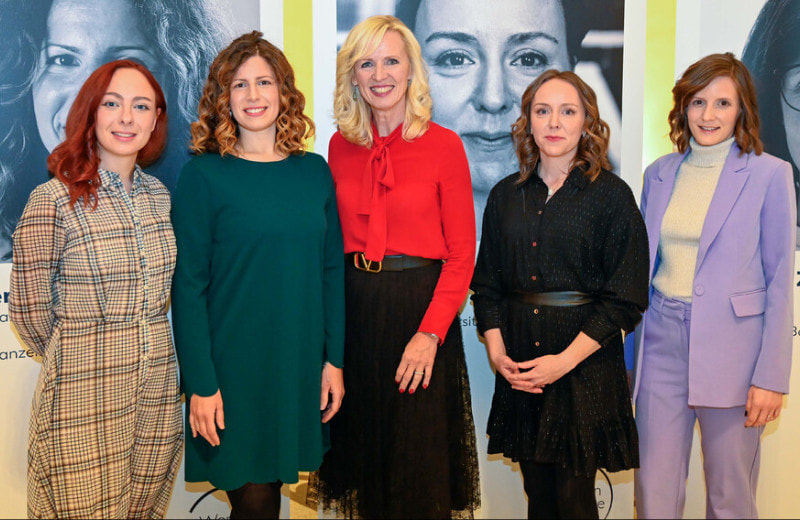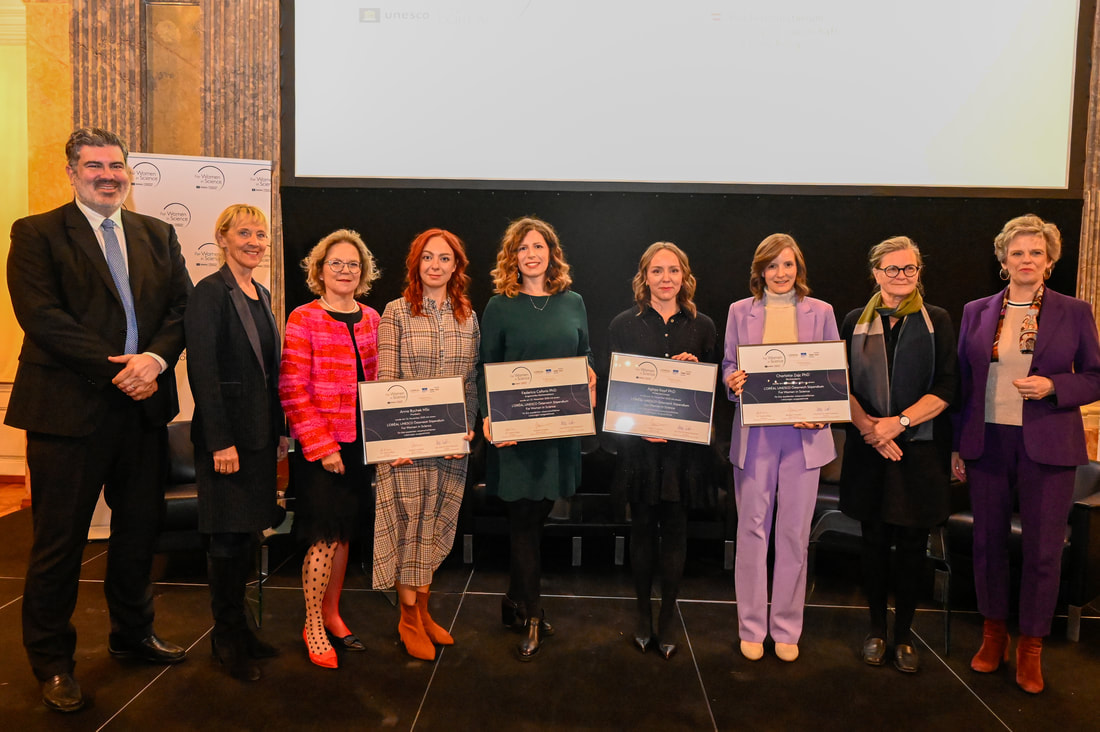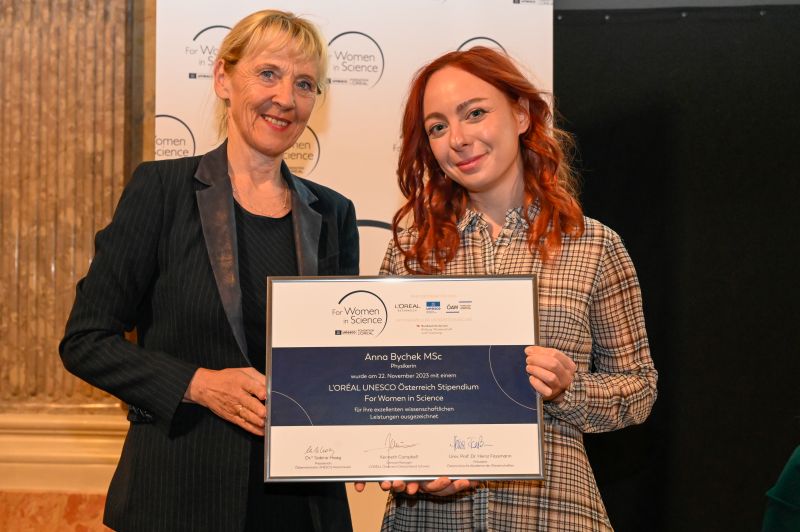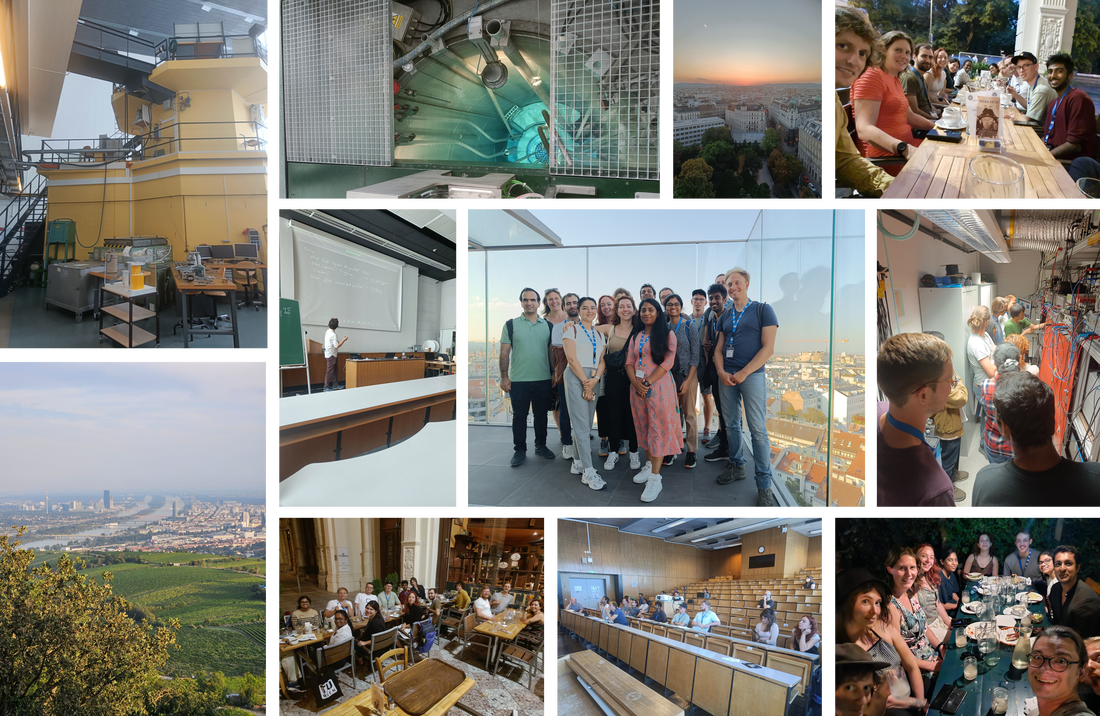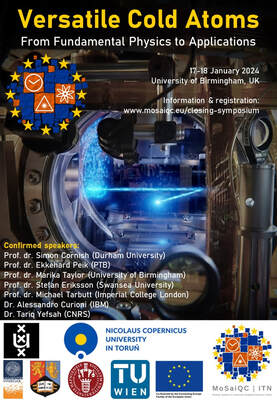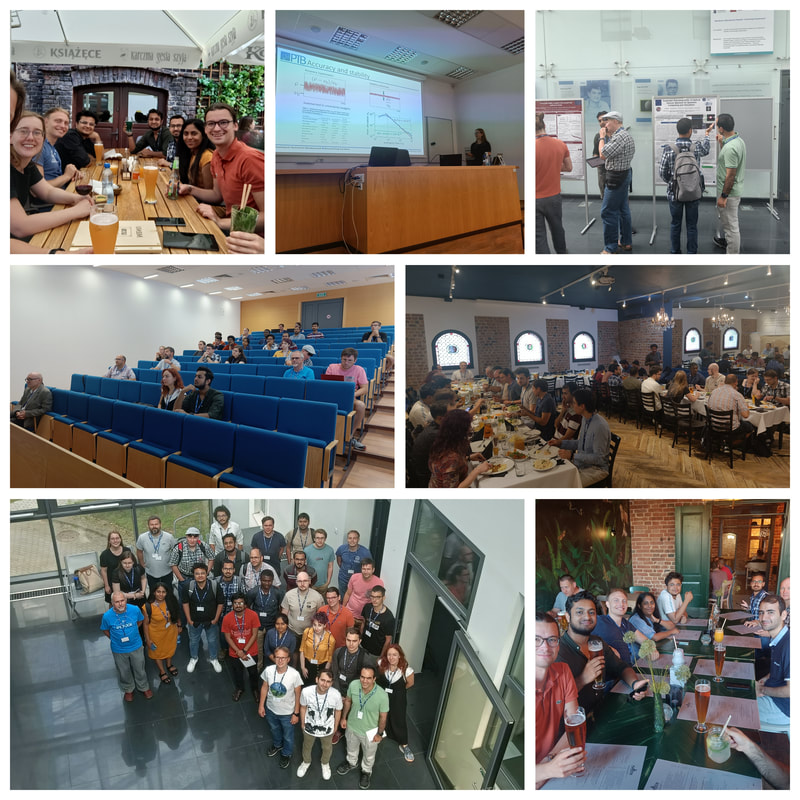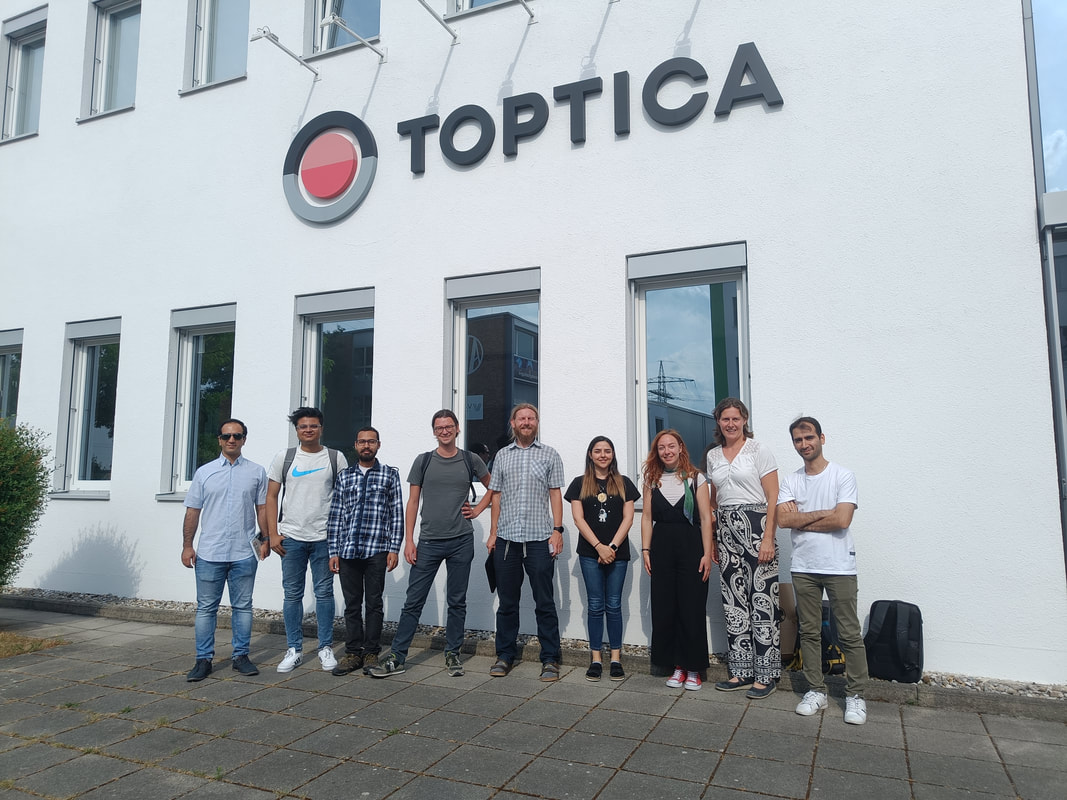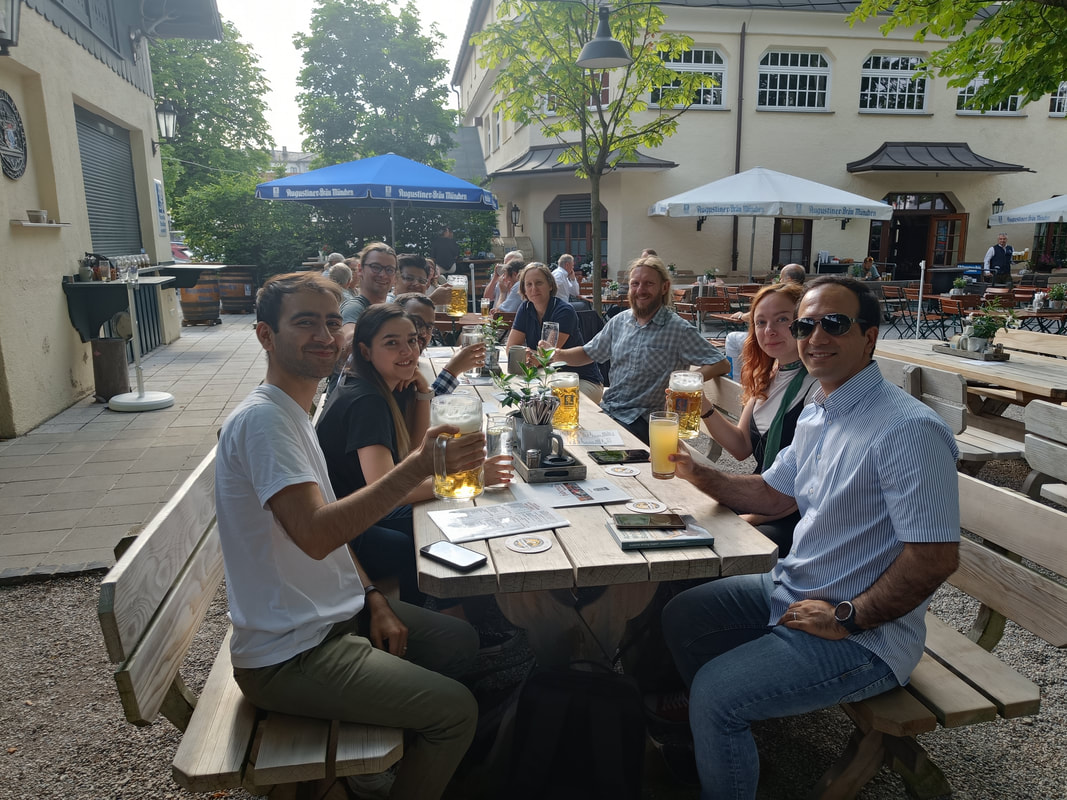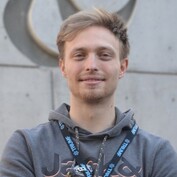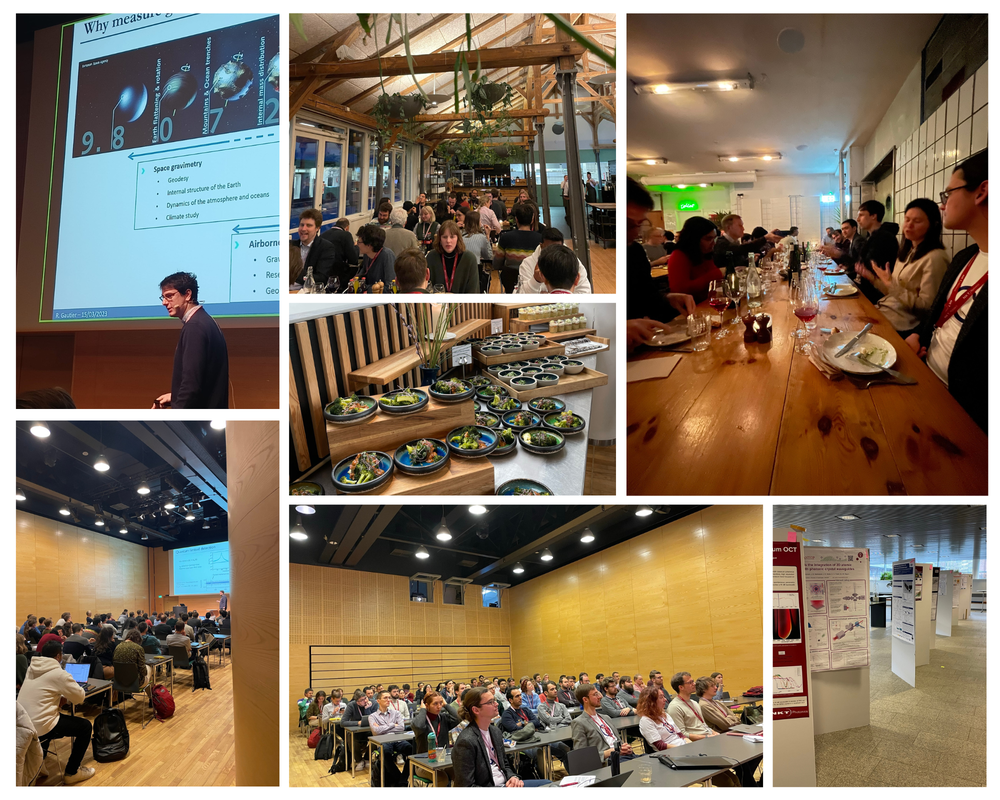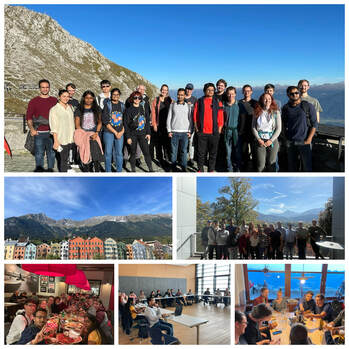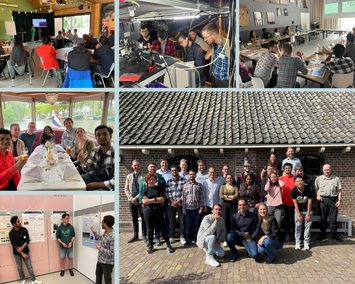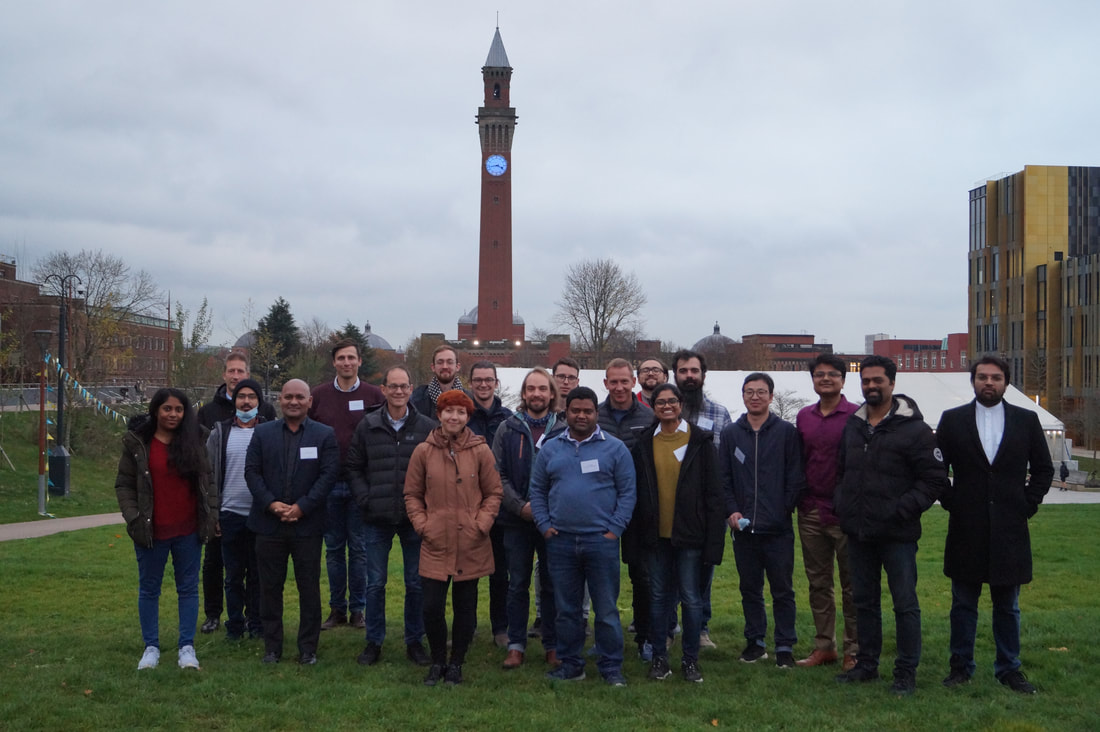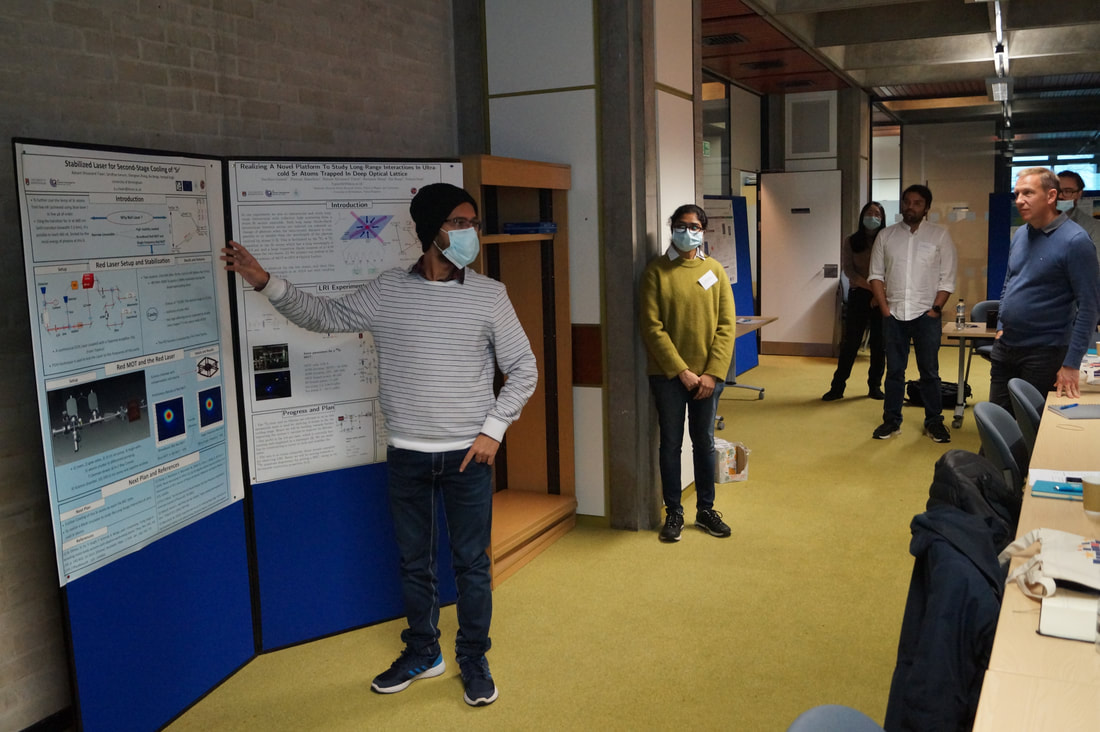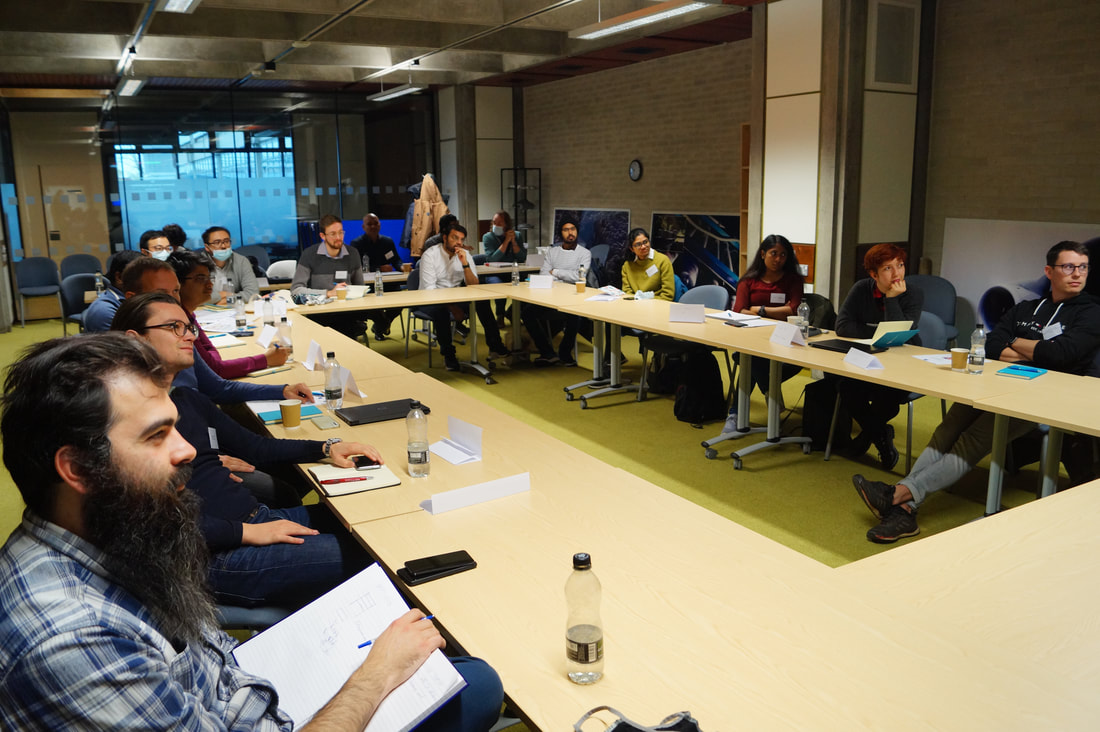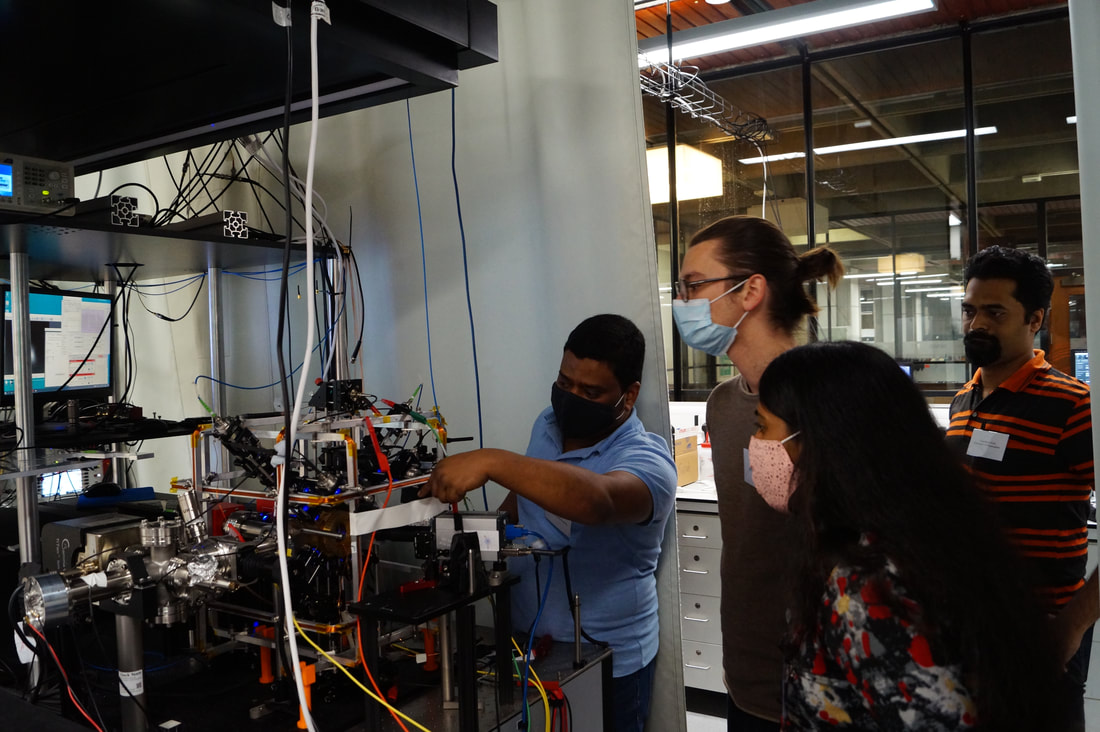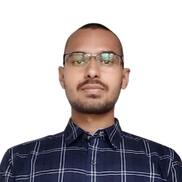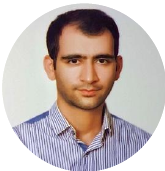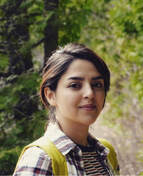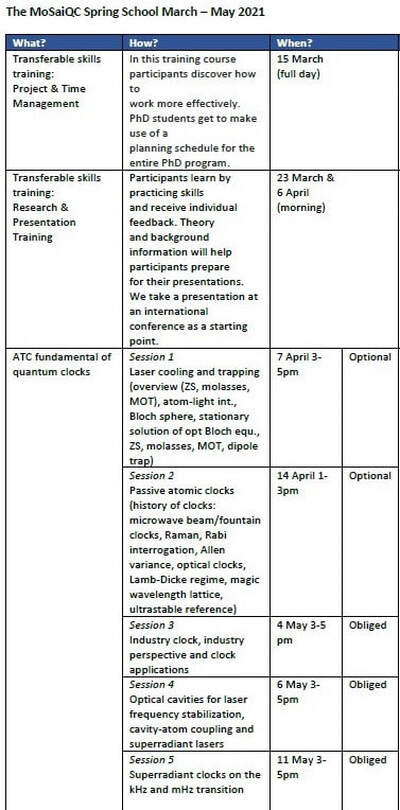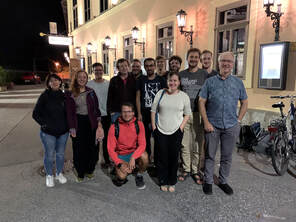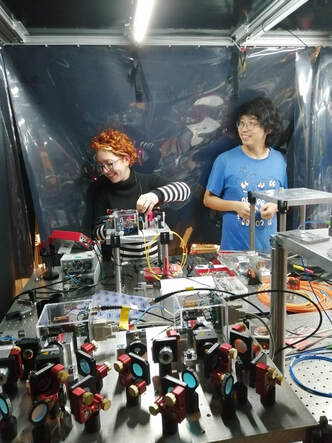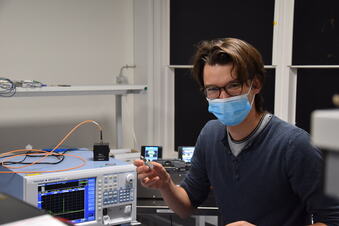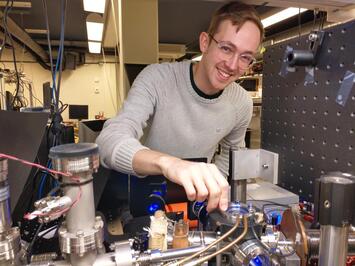22 November 2023 - MoSaiQC ESR Anna Bychek was awarded the "For Women in Science" scholarship
MoSaiQC ESR Anna Bychek was awarded the "For Women in Science" scholarship. This 25 000 euro fellowship from the "For Women in Science" funding program (a collaboration between L'Oréal Austria and the Austrian Commission for UNESCO and the Austrian Academy of Sciences). Anna will use this money to complete her PhD work at UIBK. Congratulations, Anna!
Image credits: © leadersnet.at / V. Greabu
Image credits: © leadersnet.at / V. Greabu
15 September 2023 - The MoSaiQC Autumn School on Quantum Optics, Cold Atoms and Laser Technologies
|
The MoSaiQC Autumn School on Quantum Optics, Cold Atoms and Laser Technologies took place at TU Vienna this week. MoSaiQC ESRs and other participants enjoyed scientific lectures, a poster session, trainings and teambuilding activities. Thank you everyone for participating and shout-out to Georgy Kazakov and ESRs Swadheen and Anna for making this happen!
|
16-19 January 2023: Company visit to British Telecom, Closing Symposium "Versatile Cold Atoms: From Fundamental Physics to Applications" and MoSaiQC Consortium Meeting
|
From 16-19 January 2023, we will organize a company visit to British Telecom, Closing Symposium "Versatile Cold Atoms: From Fundamental Physics to Applications" and MoSaiQC Consortium Meeting to take place at University of Birmingham! For more information, please click here.
|
11-14 September 2023: MoSaiQC Autumn School on Quantum Optics, Cold Atoms and Laser Technologies
The MoSaiQC Autumn School on Quantum Optics, Cold Atoms and Laser Technologies will take place in Vienna! For more information, please click here.
10-12 July 2023 - KL FAMO, MoSaiQC & AQuRA School on Charged Particle Traps
|
The MoSaiQC, AQuRA & KL FAMO Summer School “School on Charged Particle Traps” took place at the Nicolaus Copernicus University in Torun (Poland). Participants attended lectures about charged particle traps, storage of particles at CERN, ion clocks and trapped ions for quantum computing and presented their work during the poster session. The school brought together MoSaiQC ESRs, KL FAMO PhD students & postdocs and external participants and was a great success!
|
26-30 June 2023 - MoSaiQC ESRs at CLEO, Laser World of Photonics & company visit to TOPTICA in Munich
|
The MoSaiQC ESRs were in Munich this week to attend the Laser World of Photonics conference and CLEO Tradeshow. In addition, the ESRs were welcomed at TOPTICA to learn more about the R&D and career possibilities at TOPTICA. We ended the day with a dinner at a traditional Bavarian Beer Garden. We thank TOPTICA for this opportunity!
|
1 May 2023 - Welcome András Krisztián Gácsbaranyi
March 2023 - QESR2023 took place in Copenhagen
October 2022 - The MoSaiQC Autumn School took place in Innsbruck
23-27 May 2022 - The MoSaiQC Spring School took place in Amsterdam !
7 March 2022 - iqClock Industry Day
Kicked-off in October 2018, the iqClock EC Quantum Flagship project is coming to a close this Spring.
On this occasion, the University of Birmingham (UoB) invites interested parties from across industry and academia to join the iqClock Industry Day. They will showcase the results of the project and draw up perspectives for the next steps towards the commercialization of optical lattice clock technology including routes to end user cases for optical clock technology.
With the iqClock Industry Day, the UoB offers a stage to stakeholders from inside and outside the iqClock Consortium. The two sessions include time for panel discussion with the session speakers. The event is free to attend will be fully virtual with details on how to access the Zoom meeting communicated a few days prior. For more information click here.
1 February 2022- Benedikt Heizenreder hired as ESR2 at the UvA
Benedikt is hired as one of the Early Stage Researchers on superradiant clocks at the University of Amsterdam. He will be working as ESR2. The goal of his work is to realize continuous operation on the mHz-linewidth clock transition. Benedikt did his undergraduate work at the Ludwig Maximilian University of Munich and at Immanuel Bloch's group at the MPQ. Additionally, he was able to gain some industry experience during an internship at Toptica Photonics. Welcome Benedikt!
26 November - MoSaiQC Autumn School in Birmingham a success!
The MoSaiQC Autumn School took place in-person between 22 and 24 November at the University of Birmingham. It was the first in-person event at which the Early-Stage Researchers (ESRs) and MoSaiQC beneficiaries got to know each other. The School was also livestreamed for those ESRs who were not able to join in-person. Lectures about ATC Industrial Perspectives on Quantum Technologies were given by speakers from the MoSaiQC Consortium and other professionals in the field, complemented by lab-tours at the University of Birmingham and teambuilding events. On 25 and 26 November the ESRs also joined the iqClock in-person meetings. The next network event will take place in Amsterdam in March 2022.
7 October - MoSaiQC Autumn School taking place in-person in Birmingham from
22 to 24 November 2021 - register now!
Between 22-24 November 2021 the MoSaiQC Autumn School takes place in-person at the University of Birmingham. The theme of the Autumn School is 'ATC Industrial Perspective on Quantum Technologies'. Early-Stage Researchers and network members are invited to take part in the school. Additionally, there are limited spots available for external PhD-students (£95,-) to join the programme. Please have a look at the (concept) programme of the MoSaiQC Autumn School below. Click here to go to the official registration form.
Subsequently, on 25 and 26 November the iqClock network meeting will take place. This meeting is only open for network members and Early-Stage Researchers of the MoSaiQC project and iqClock project. More information about the programme will be published shortly on www.iqclock.eu/news.html.
Subsequently, on 25 and 26 November the iqClock network meeting will take place. This meeting is only open for network members and Early-Stage Researchers of the MoSaiQC project and iqClock project. More information about the programme will be published shortly on www.iqclock.eu/news.html.
29 September 2021- Balsant joins the University of Birmingham!
|
On 29 September 2021, Balsant Shivanand Tiwari joined the University of Birmingham as ESR 14. He will be working on the development and characterization of a compact and integrated atomic packages for a strontium optical lattice clock. Focus will be given to creating a vacuum environment for the atoms which either minimizes the aforementioned effects or allows for an improved characterization and correction of them.
Welcome Balsant! |
1 July 2021- Two new ESRs joined MoSaiQC!
|
Two new ESRs have joined MoSaiQC as of June and July 2021. We welcome Omid and Sana.
Omid Vartehparvar is employed at the Nicolaus Copernicus University. He has graduated with a master of physics at University of Zanjan, Iran, with the thesis titled “Active collector of sunlight using Fresnel mirrors”. He will work on the topic of 'moving from a superradiant laser to a frequency standard'. Omid has worked as a researcher and developer in a science start-up before. Sana Boughdachi has been hired as Early-Stage Researcher at TOPTICA Photonics. She will work on low phase noise clock laser and other cooling, lattice, re-pump lasers and novel laser lock and rapid wavelength tuning techniques. She will design the laser and required optical and electronic systems. Welcome Omid and Sana! |
15 March 2021 - Kick-off Spring School
Today the Spring School for the Early-Stage Researchers has started. The Spring School is a series of trainings provided to all ESRs between March and May and teaches them transferable skills and fundamentals on quantum technology. The school will be repeated and advanced every 6 months and professionals are invited to teach on assigned topics. For further information on the training topics and planning the MoSaiQC Project Manager can be contacted. An impression of the Spring School planning can be viewed here:
1 March 2021 - Welcoming three new ESRs
This month we would like to welcome three more Early- Stage Researchers. Abhilash Jha and Sandhya Ganesh have started their work at the University of Birmingham. Lakshmi Rajagopal has joined British Telecom. We are looking forward to a fruitful collaboration with them.
18 November 2020 - Introduction meeting of ESRs
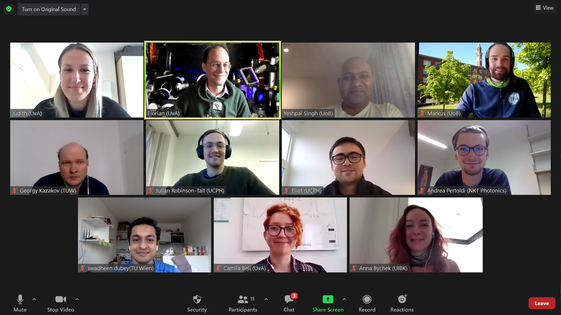
On 18 November, the first online meeting with the appointed Early Stage Researchers was held to get to know each other. Judith Kreukels, Projectmanager at the University of Amsterdam (UvA), provided a general introduction to ITNs and the MoSaiQC project. Prof. Florian Schreck from the Faculty of Science at the UvA elaborated on the topic of industry clocks. Markus Gellesch, research fellow at the University of Birmingham, introduced the topic of super radiant clocks. Over the next months a series of webinars will be held in which the ESRs present their master thesis.
1 November 2020 - Welcome Mehrdad Zarei !
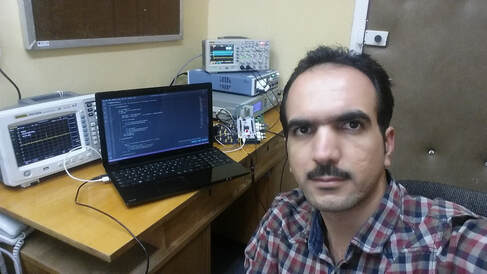
Mehrdad Zarei has started working as Early-Stage Researcher at the Nicolaus Copernicus University as of November 2020. He will work on the autonomous frequency stabilisations in a superradiant clock. He monitors and controls systems that will allow for automatic and unattended operation of a superradiant optical clock. The solutions developed within this task require new hardware for automatic control and re-locking of laser and cavities systems and adjustment of optics, as well as software for automatic scheduling of procedures that currently require human intervention. Welcome Mehrdad!
1 October 2020 - Welcome Swadheen Dubey !
Swadheen Dubey has started as an Early Stage Researcher at the University of Vienna this month. He will work on theoretical aspects and simulation of the superradiant laser with focus on influence of various experimental conditions, real-life effects and imperfections on the properties of this laser. Welcome Swadheen!
1 September 2020 - Welcome to two new Early Stage Researchers !
1 March 2020 - Eliot Bohr hired as the first ESR at the University of Copenhagen
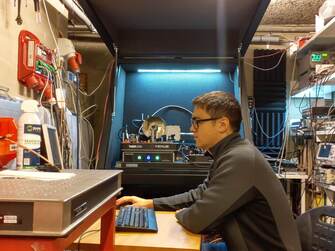
Eliot Bohr is hired as the first MoSaiQC Early Stage Researcher. Eliot will work at the University of Copenhagen on setting up an ultra-stable reference laser which he will use to investigate super radiant lasing and other collective atom-cavity effects on the kHz transition in strontium. Welcome Eliot!
15 May 2019 - MoSaiQC proposal funded!
The European Commission has notified the MoSaiQC consortium that their ITN proposal is accepted for funding!
MoSaiQC will train 15 Early Stage Researchers, giving them hands-on experience in all aspects of optical clocks,
from theoretical foundations, over the development of advanced components (e.g. laser systems, vacuum, electronics,...), to
applications in all relevant industry sectors. The ESRs will push the boundaries of clock technology, especially in view of
advanced, portable clocks and a promising, so far not realized type of clocks, superradiant clocks.
The project will start on March 1, 2020.
MoSaiQC will train 15 Early Stage Researchers, giving them hands-on experience in all aspects of optical clocks,
from theoretical foundations, over the development of advanced components (e.g. laser systems, vacuum, electronics,...), to
applications in all relevant industry sectors. The ESRs will push the boundaries of clock technology, especially in view of
advanced, portable clocks and a promising, so far not realized type of clocks, superradiant clocks.
The project will start on March 1, 2020.

